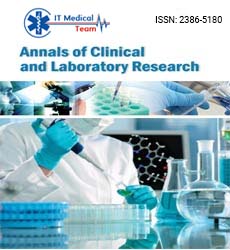Short Communication - (2023) Volume 11, Issue 6
The Human Genome Project: 20 Years of Discoveries and Medical Breakthroughs
David Muir*
Department of Medical Sciences, University of Edinburgh, UK
*Correspondence:
David Muir, Department of Medical Sciences, University of Edinburgh,
UK,
Email:
Received: 01-Nov-2023
Published:
27-Nov-2023, DOI: 10.36648/2386-5180.23.11.492
Introduction
Twenty years have passed since the completion of the Human
Genome Project (HGP), a monumental scientific endeavour that
forever changed our understanding of genetics and medicine. The
HGP, which mapped and sequenced the entire human genome,
has not only provided crucial insights into human biology but has
also paved the way for ground-breaking medical discoveries and
personalized medicine. This article explores the impact of the
HGP on genetics, medicine, and the future of healthcare [1].
The Human Genome Project: The Human Genome Project,
initiated in 1990 and completed in 2003, was a collaborative
effort involving thousands of scientists from around the world.
Its primary goal was to identify and map all the genes in human
DNA and determine their precise sequence. This herculean task
was made possible by advances in DNA sequencing technology,
computational biology, and international cooperation [2].
Mapping the Blueprint of Life: One of the most significant
achievements of the HGP was creating a comprehensive map of
the human genome. This map, akin to a blueprint for building
a human being, identified the location of genes and their
functions within our DNA. This knowledge opened the door to
understanding the genetic basis of various diseases, as well as
the genetic variations that make each person unique [3].
Disease Genetics: The HGP has enabled researchers to identify
the genetic roots of numerous diseases, from common conditions
like diabetes and heart disease to rare genetic disorders. This
knowledge has led to better diagnostic tools and targeted
therapies [4].
Pharmacogenomics: Understanding genetic variations has
allowed for personalized medicine. Pharmacogenomics, a field
that studies how an individual's genetic makeup influences their
response to drugs, has led to more effective and safer drug
treatments [5].
Cancer Genomics: The HGP has been instrumental in cancer
research. By sequencing the genomes of various cancer types,
scientists can develop targeted therapies and better predict a
patient's response to treatment, improving overall survival rates
[6].
Challenges and Ethical Considerations: While the HGP's impact
has been overwhelmingly positive, it has also raised ethical and privacy concerns. The availability of genetic information has
led to debates about data security, informed consent, and the
potential for discrimination based on genetic data. These issues
have spurred discussions on how to strike a balance between
advancing medical science and safeguarding individuals' privacy
and rights [7].
The Future of Healthcare: As we reflect on 20 years of HGP, it's
clear that this ground-breaking project has laid the foundation
for the future of healthcare. Here are a few ways in which the
HGP will continue to shape the field [8].
Precision Medicine: The era of one-size-fits-all treatments
is coming to an end. Thanks to the HGP, healthcare is moving
toward personalized medicine, where treatments are tailored to
an individual's unique genetic makeup [9].
Preventive Medicine: Armed with the knowledge of genetic
risk factors, healthcare providers can emphasize prevention.
Individuals at higher genetic risk for certain diseases can take
proactive measures to reduce their susceptibility [10].
Conclusion
The Human Genome Project's impact on genetics, medicine, and
the future of healthcare cannot be overstated. Over the past
two decades, it has transformed the way we diagnose, treat, and
prevent diseases, providing hope for countless individuals and
families. As we celebrate this milestone, we must also continue to
address ethical concerns and ensure that the benefits of genomics
are accessible to all. With ongoing research and technological
advancements, the next 20 years promise even more exciting discoveries and medical breakthroughs, further solidifying the
HGP's legacy as a cornerstone of modern medicine.
References
- Collins FS, McKusick VA (2001). Implications of the Human Genome Project for medical science. Jama. 285(5):540-4.
Indexed at, Google Scholar, Cross Ref
- Collins FS (1999). Medical and societal consequences of the human genome project. N Engl J Med.341(1):28-37.
Indexed at, Google Scholar, Cross Ref
- Bodmer WF, McKie R (1997). The book of man: the Human Genome Project and the quest to discover our genetic heritage. Oxford University Press, USA.
Indexed at, Google Scholar
- Aneli S, Birolo G, Matullo G (2022). Twenty years of the Human Genome Diversity Project. Human Population Genetics and Genomics. 2(4):1-7.
Indexed at, Google Scholar, Cross Ref
- Kirby M (1994). The human genome project-promise and problems. J. contemp. health L. & pol'y.11:1.
Indexed at, Google Scholar
- Lunshof JE, Bobe J, Aach J, Angrist M, Thakuria JV, et al (2010). Personal genomes in progress: from the human genome project to the personal genome project. Dialogues Clin. Neurosci.
Indexed at, Google Scholar, Cross Ref
- Whitley KV, Tueller JA, Weber KS (2020). Genomics education in the era of personal genomics: academic, professional, and public considerations. Int. J Mol Sci. 21(3):768.
Indexed at, Google Scholar, Cross Ref
- Collins FS, Patrinos A, Jordan E, Chakravarti A, Gesteland R, et al (1998-2003). New goals for the US human genome project: 1998-2003. 282(5389):682-9.
Indexed at, Google Scholar, Cross Ref
- Choudhuri S (2003). The path from nuclein to human genome: A brief history of DNA with a note on human genome sequencing and its impact on future research in biology. Bull Sci Technol Soc. 23(5):360-7.
Indexed at, Google Scholar, Cross Ref
- Paneth N, Vermund SH (2018). Human molecular genetics has not yet contributed to measurable public health advances. Perspect. Biol. Med. 61(4):537-49.
Indexed at, Google Scholar, Cross Ref
Citation: Muir D (2023) The Human Genome Project: 20 Years of Discoveries and Medical Breakthroughs. Ann Clin Lab Res. Vol.11 No.6:492






